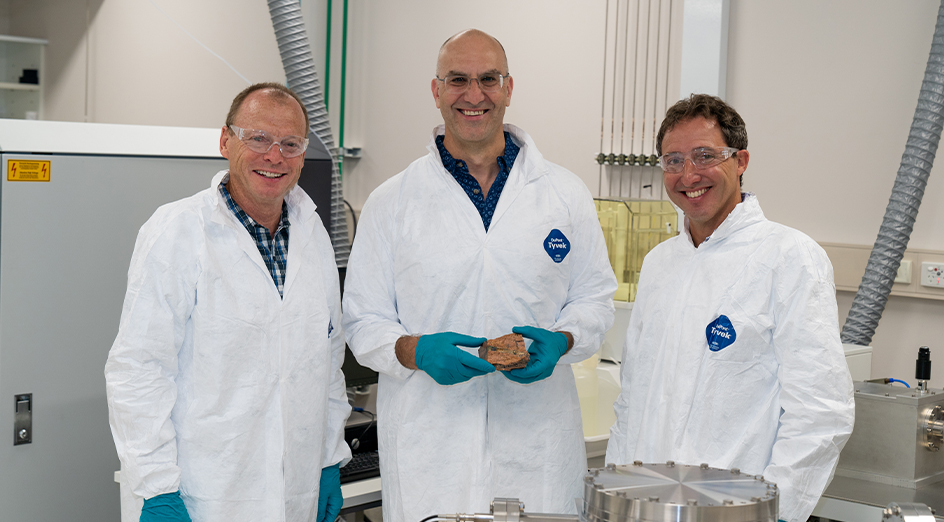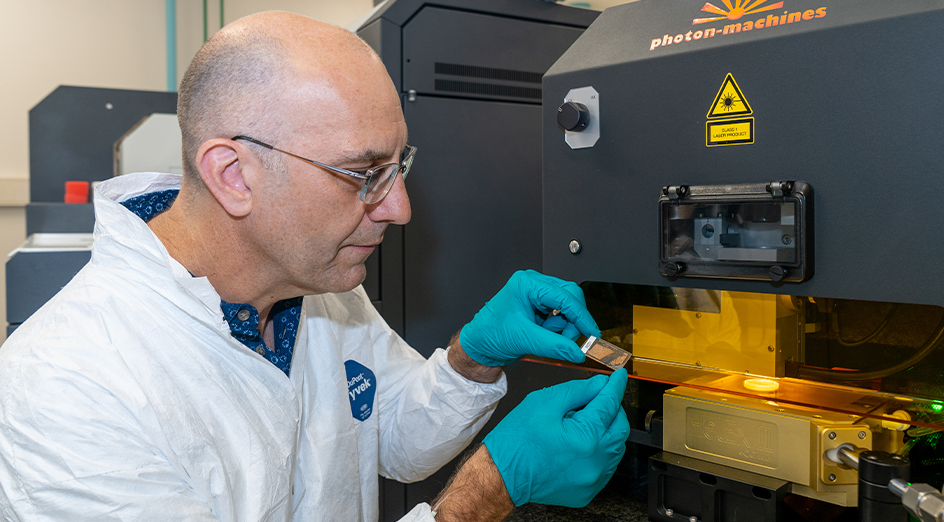Developing new methods to accurately locate high quality deposits of copper and reduce the environmental impact of mining is the focus of a new partnership between The University of Western Australia, BHP and the University of Bristol.
Professor Steffen Hagemann, Professor Marco Fiorentini and Professor Tony Kemp from UWA’s Centre for Exploration Targeting will lead a team of researchers who will analyse key processes responsible for the grouping of elusive metals in the Earth’s crust.

Professor Steffen Hagemann, Professor Tony Kemp and Professor Marco Fiorentini inspecting a copper-rich ore sample at UWA's Inductively Coupled Plasma Mass Spectrometry (ICP-MS) facility.
UWA’s Centre for Exploration Targeting and the University of Bristol were jointly selected to partner with BHP following a highly competitive selection process with an international group of applicants.
"Our research will help the resources sector identify where high-grade copper deposits are located, which will drive smarter exploration and enable more efficient mining."
Professor Steffen Hagemann
Centre director Professor Steffen Hagemann said the exciting and innovative research partnership would bring together world-class geo-scientists to help solve the worldwide copper shortage.
“Our research will help the resources sector identify where high-grade copper deposits are located, which will drive smarter exploration and enable more efficient mining,” Professor Hagemann said.
High-grade copper mines – which contain a high concentration of copper – allow resource companies to excavate smaller areas to extract the same amount of copper as a larger, but lower grade mine.
“Discovering high-grade copper deposits will also enable resource companies to increase the overall environmental sustainability of their mines.”

Professor Tony Kemp preparing to load a petrographic thin section of an ore sample into a laser ablation system
Vice-President, Metals Exploration at BHP, Keenan Jennings, said the partnership would further inform BHP’s global strategy to discover new, high-quality copper deposits.
“BHP views UWA’s Centre for Exploration Targeting as thought leaders in the understanding of mineral systems, and a gateway to global research capabilities in geosciences,” Mr Jennings said.
“The collaboration helps to build capacity for industry-facing fundamental researchers to participate in the discovery of the next generation of mineral deposits in Australia and abroad.”
“I’m excited by the potential of this project, and congratulate all those involved in bringing this world-leading team together.”
UWA Vice-Chancellor Amit Chakma
UWA Vice-Chancellor, Professor Amit Chakma, said that such collaboration was essential to the creation of new knowledge and to advancing the welfare of the entire community.
“I’m excited by the potential of this project, and congratulate all those involved in bringing this world-leading team together.”
Professor Hagemann said solving the worldwide copper shortage problem would help secure the world’s future green economy, as the resource is critical for renewable technology applications such as batteries, electric vehicles and wind farms.
“In order to move towards a fully renewable, sustainable and green economy, we’ll need to find more copper than has ever been mined to date,” Professor Hagemann said.
One of the main goals of UWA’s Centre for Exploration Targeting is to develop critical knowledge that would help discover metals that will make tomorrow possible.
“Accurately locating scarce commodities is becoming increasingly difficult in an energy and socio-economically constrained world and our research will fuel the renewable energy of tomorrow,” Professor Hagemann said.
Media references
Nicholas Smith, UWA Media Officer, 08 6488 1888 / 0411 644 492
